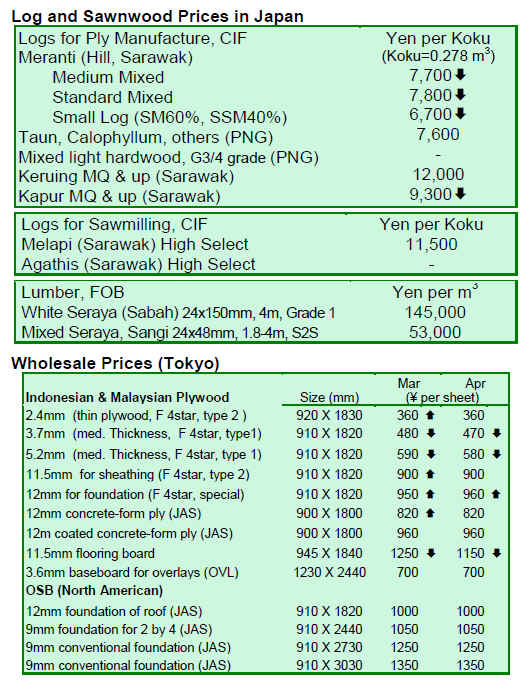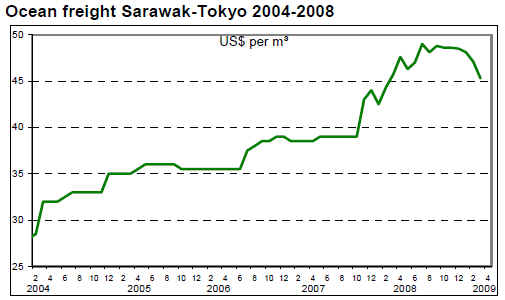Japan Wood Products
Prices
Dollar Exchange Rates of
14th Apr. 2009
Japan Yen 97.25
Reports From Japan
Market prices expected to bottom out after Golden Week holidays
Japan Lumber Journal reported on the meeting of the
Lumber Price Market Investigation Committee of Tokyo
Lumber Wholesalers’ Association, which confirmed the
sluggish movement of products in the last few months of
2009. During the meeting, most wholesalers agreed the
market was likely to bottom out after the Japanese Golden
Week holidays, traditionally held in the first week of May.
There continued to be no shortage of supply until early
March for Southsea logs, even though rains in Malaysia
have hampered logging operations, as there was limited
demand for logs in Japan. However, orders for second
grade melapi lumber were moving. Plywood demand
continued to be low in early March because of low
housing starts in Japan, and manufacturers were reported
to have cut production substantially. Nevertheless, this
move did not prompt price rises. At the end of March
2009, however, JLJ reported some shortage in domestic
supply of imported plywood, as declines in new arriving
shipments began to affect end users. Supply was expected
to get shorter in April.
Income of Japan’s forest owners on the decline in 2007
The Ministry of Agriculture, Forestry and Fisheries
(MAFF) reported on the gross income of forest owners in
Japan, which showed declines of nearly 27% by value. JLJ
indicated forest income, which is based on gross income
less management expenses, also fell 39% when compared
to 2006 levels. The slump was attributed to the weakness
in timber prices, which caused forest owners to face a
more severe business environment.
In other domestic statistics for 2007, MAFF also said total
forestry output increased 2%, reaching 441 billion yen.
The highest revenue generating items in 2007 were logs
(JPY226 billion yen) and cultivated mushrooms (JPY208
billion yen). Income from forestry production fell
marginally, however, reaching a total of 246 billion yen.
Despite these results for 2007, MAFF reported an 80%
increase in exported logs, with exports of domestic logs
rising nearly 1.8 times higher than in 2007. In 2008, Korea
received the largest amount of Japan’s log exports,
followed by China.
Vietnam becomes important pulp source for Japan and China
According to the Wood Resource Quarterly, Vietnam is
becoming one of the most important suppliers of eucalypt
and acacia chips to Japan and China. The chips were
among the lowest cost imported chips to Japan in 2008,
just higher than those from Malaysia and Thailand.
Vietnam has quickly expanded its plantation resources to
supply wood chips during 2002 to 2008, when it became
the fourth largest exporter of wood chips in the world.
Despite this significant increase in imports during the last
year, this trend is not expected to continue in the longterm.


|
Abbreviations
| LM Loyale Merchant, a grade of log parcel |
Cu.m
Cubic Metre |
| QS Qualite Superieure |
Koku 0.278 Cu.m or 120BF |
| CI Choix Industriel
|
FFR
French Franc |
| CE
Choix Economique |
SQ
Sawmill Quality |
| CS Choix Supplimentaire |
SSQ
Select Sawmill Quality |
| FOB Free-on-Board |
FAS Sawnwood Grade First and |
| KD Kiln Dry |
Second |
| AD Air Dry |
WBP Water and Boil Proof |
| Boule A Log Sawn Through and Through |
MR
Moisture Resistant |
|
the boards from one log are bundled |
pc per piece |
|
together |
ea
each |
| BB/CC Plywood
grades. Letter(s) on the left indicate face veneer(s), those on the right backing
veneer(s). Veneer grade decreases in order B, BB, C, CC, etc. |
MBF 1000 Board Feet
|
|
Plywood |
MDF Medium
Density Fibreboard |
| BF Board Foot |
F.CFA
CFA Franc
|
| Sq.Ft Square
Foot |
PHND
Pin hole no defect grade |
| Hoppus ton 1.8 cubic metres |
  Price has moved up or down Price has moved up or down |
|
|
|